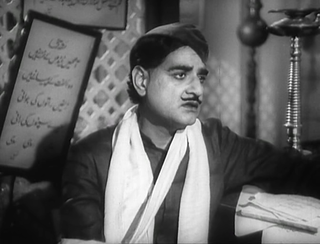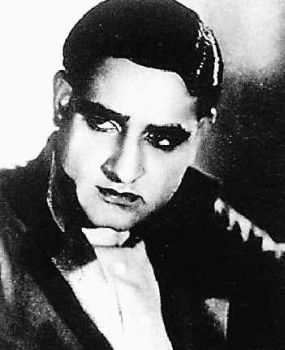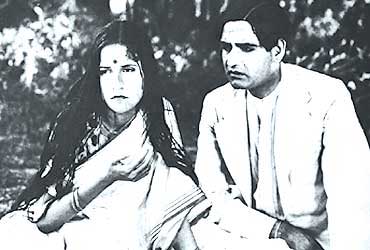
Pre-independance Indian actor and singer, K.L. Saigal plays a Mughal-era lover in in Shahjehan (1946).
Our next lyrics and English translation is of the ageless song “Jab Dil Hi Toot Gaya” from Shahjehan (1946). Known widely as early playback singer K.L. Saigal’s swansong, “Jab Dil Hi Toot Gaya” is a song close to my heart and family. K.L. Saigal was my great-great uncle through my Kashmiri Nani who grew up in Jammu near Saigal sahib‘s birthplace. It’s a song that defined a generation, and one that sadly, many of my generation have never known. The great K.L. Saigal’s voice was the voice of my grandparents–the voice of men and women who can remember a time before India gained independence, before the partition destroyed Punjab, and before Bollywood was redefined as a spectacle of the mass ornament. He was a superstar before there was Mohammed Rafi and before the rise of Lata Mangeshkar. For he lived and died in an era that did not know the glitter of Eastmancolor or the dazzle of expensive special effects. K.L. Saigal was an artist when poetry reigned supreme.
Like Al Jolson in America, K.L. Saigal revolutionized music in the 1930s and 1940s in the early days of “talkies” when the concept of a “playback singer” had not been born. He acted in his own films–including the famous 1935 Devdas that has been since remade by countless Bollywood thespians. You may not know his work, but you know his legacy. He left a profound stylistic impact on the great singers of the Golden era that would follow (think Mukesh’s “Dil Jalta Hai” from Pehli Nazar to understand how hard these artists sought to emulate Saigal sahib)! Perhaps you recall the song playing in background of Dilwale Dulhania Le Jayenge (1995) as Simran’s father returned home–it was none other than K.L. Saigal’s “Gham Diye Mushtaqil,” meant to represent the traditions of an backward generation–but in my opinion that sells it unfairly short. K.L. Saigal’s masterpieces may seem old-fashioned now, but they were the hallmark of those who fought for civil rights and equality, who dreamed of romance and greater things than the dull lives they were trapped in, and who believed in a future better than their own. Perhaps his audience is not so different from today’s. Me, when I hear “Jab Dil Hi Toot Gaya“, I am always reminded of my grandparents who used to sing this song at the most unexpected moments–for in its words are not just the roots of Bollywood as we know it, but of our own traditions.

K.L. Saigal (1904-1947) passed away at the age of 43 after years of struggling with alcoholism. Someone tell me he doesn’t look straight from a German Expressionist film here–look at those piercing eyes!
I hope I can convince you to open your mind to the world of Hindi cinema before the Golden Age–at least this once! I think Saigal sahib‘s depth will surprise you–and perhaps you’ll recognize in the soulful lyrics of Majrooh Sultanpuri the many reincarnations of a similar theme that followed. In Shahjehan (1946), K.L Saigal plays a rejected lover involved in a complicated royal coup that ultimately ends in both a happy marriage for him and the construction of the Taj Mahal for eternity. Intriguing, no? Our lyrics and English translation to “Jab Dil Hi Toot Gaya” are below. Follow along with the video, and do let us know your thoughts on this old school number in the comments!
Jab Dil Hi Toot Gaya Lyrics and Translation:
Jab dil hii TuuT gayaa
When my heart is broken
Ham jii ke kyaa kare.Nge?
What can I do by living?
Ulfat ka diyaa hamne is dil mei.N jalaayaa thaa
I lit the flame of love in my heart
Umiid ke phoolo.N se is ghar ko sajaayaa thaa
I decorated this house with the flowers of hope
Ek bhedii looT gaayaa
And one of my own stole everything
Ham jii ke kyaa kare.Nge?
What can I do by living?
Jab dil hii TuuT gayaa
When my heart is broken
Maaluum na thaa intii mushkil hai.N merii raahe.N
I was not aware that my paths would prove so difficult
Armaan ke bahe aa.Nsuu, hasrat ne bhari aahe.N
I shed tears of desire, unfulfilled wishes filled my sighs
Har saathii chhuuT gayaa
Every companion abandoned me
Ham jii ke kyaa kare.Nge?
What can I do by living?
Jab dil hii TuuT gayaa
When my heart is broken
Glossary:
ulfat: love; diyaa: flame, candle; umiid: hope; phool: flower; bhedi: an insider, one of your own; maalum: awareness; mushkil: difficult; armaan: desire; aa.Nsuu: tears; hasrat: unfulfilled wish; aah: sigh; saathii: companion
Did you know that at the age of 13, a young Mohammed Rafi actually met K.L. Saigal? According to a new biography, Rafi sahib got the chance to meet his idol at a K.L. Saigal concert in Lahore in which young Rafi spontaneously performed a Punjabi solo to the accolades of the crowd. K.L. Saigal was so impressed with the boy’s talent, he patted him on the head and declared he would be a great singer one day!
-Mrs. 55


Great post, this begins to explain where your wonderful musical talent comes from! I am sure he would have been proud to see his legacy carried on in such a wonderful manner for this new generation.
Thank you! I hope he would be, and I hope we’re able to keep the newer generations excited by music and legacies of yesteryear!
Wow…that’s so cool…. Saigal saheb was your great great uncle! I think my own grandfather was very fond of K.L. Saigal’s songs…though K.L. Saigal’s era in music was somewhat before his time as well…and Majrooh Sultanpuri is one of my favourite lyricists…very nice song 🙂
Haha yeah, K.L. Saigal is definitely a master of an era that predates the popularity we associate with Bollywood’s “Golden Era” of the 50s and 60s. But to appreciate his music is to understand the origins of Bollywood traditions we cherish today–and as an example of the great Majrooh Sultanpuri’s early work, we can certainly see its importance!
Pingback: Aayega Aanewala Lyrics and Translation: Let’s Learn Urdu-Hindi | Mr. & Mrs. 55 - Classic Bollywood Revisited!
Rafi sang at least one song with the great Saigal–“Dunia Rang Rangeli.”
Coming from elders who are no longer living; it was generally accepted that Saighal was the greatest before partition. If anyone dared to criticize Saighal there was bound to be a fight in a gathering!